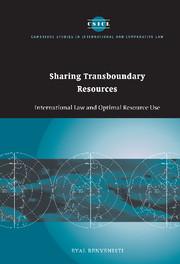Book contents
- Frontmatter
- Contents
- Acknowledgments
- Table of cases
- List of abbreviations
- 1 Introduction
- 2 The need for collective action in the management of transboundary resources
- 3 States as collective actors
- 4 The transnational conflict paradigm: structural failures and responses
- 5 Transnational institutions for transboundary ecosystem management: defining the tasks and the constraints
- 6 The structure and procedure of institutions for transboundary ecosystem management
- 7 The development of positive international law on transboundary ecosystems: a critical analysis
- 8 Efficiency, custom, and the evolution of international law on transboundary resources
- 9 Conclusion
- Bibliograhy
- Index
- CAMBRIDGE STUDIES IN INTERNATIONAL AND COMPARATIVE LAW
3 - States as collective actors
Published online by Cambridge University Press: 14 July 2009
- Frontmatter
- Contents
- Acknowledgments
- Table of cases
- List of abbreviations
- 1 Introduction
- 2 The need for collective action in the management of transboundary resources
- 3 States as collective actors
- 4 The transnational conflict paradigm: structural failures and responses
- 5 Transnational institutions for transboundary ecosystem management: defining the tasks and the constraints
- 6 The structure and procedure of institutions for transboundary ecosystem management
- 7 The development of positive international law on transboundary ecosystems: a critical analysis
- 8 Efficiency, custom, and the evolution of international law on transboundary resources
- 9 Conclusion
- Bibliograhy
- Index
- CAMBRIDGE STUDIES IN INTERNATIONAL AND COMPARATIVE LAW
Summary
What motivates states?
The theory and observed practice of collective action provide us with some hope with respect to the possible evolution of cooperation between states sharing transboundary resources. As availability becomes scarce, the net benefits from investments in shared institutions become positive. But such optimism may be unwarranted, in light of the special character of states as collective actors in the international arena. The shadow of sovereignty casts a serious doubt over the potential of interstate cooperation. This chapter explores the nature of states as collective actors. Its goal is to explain why we too often see a failure on the part of states to act in accordance with the predictions on the theory of collective action. The chapter deals first with the doubt regarding the tendency of states to seek relative rather than absolute gains. Unlike individual actors, states often do not seek to maximize their respective gains from their transactions, but, rather, prefer to increase the power gap between themselves and other states. The chapter then delves into the more complex question of the nature of the state as a heterogeneous rather than a unitary actor. Unlike individual farmers who share a local spring or commons, the argument goes, states have also internal conflicts of interests, and hence their behavior and constraints at the international game level may differ from those of individual actors. Do these differences mete out a devastating blow to the predictions based on the theory of international collective action?
Absolute or relative gains?
One complicating factor to the analysis of states as actors is the concern regarding the implicit assumption of the theory that actors seek absolute gains from cooperation.
- Type
- Chapter
- Information
- Sharing Transboundary ResourcesInternational Law and Optimal Resource Use, pp. 43 - 63Publisher: Cambridge University PressPrint publication year: 2002



